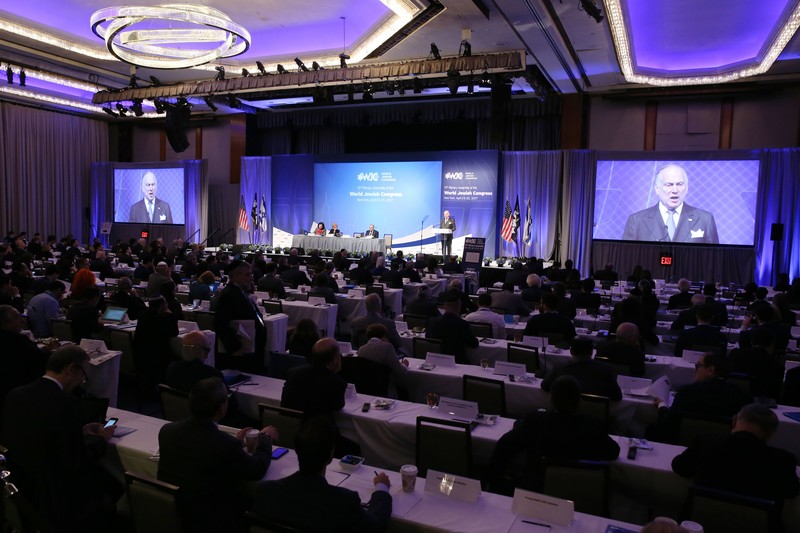The World Jewish Congress (WJC) Plenary Assembly passed several resolutions Tuesday dealing with major issues facing the Jewish world, including anti-Semitism, extremist political parties, the Middle East peace process, and combating hatred on the internet. The WJC’s supreme governing body met in the United States for the first time in the organization’s 80-year history.
The WJC also released a comprehensive report on cyberhate, finding that the overwhelming majority of anti-Semitic content on the internet emanates from the United States, followed by Germany. More than 63 percent of this content could be found on Twitter.
Policy resolutions
In their resolution, the delegates urged internet companies to urgently implement mechanisms to remove illegal and offensive hate speech from their platforms. The assembly welcomed initiatives by the European Commission and the government of Germany imposing clear standards and penalties for violators in this regard. The resolution also urged internet retailers such as Amazon to refrain from the sale of material such as books that deny the Holocaust or incite to hatred.
 The resolution on anti-Semitism called on “law-enforcement agencies in all countries to closely monitor all anti-Semitic acts, including Holocaust denial, and to enforce existing legislation proscribing hate speech and acts to the fullest extent.” The WJC also urges countries worldwide to adopt a common and binding definition of anti-Semitism.
The resolution on anti-Semitism called on “law-enforcement agencies in all countries to closely monitor all anti-Semitic acts, including Holocaust denial, and to enforce existing legislation proscribing hate speech and acts to the fullest extent.” The WJC also urges countries worldwide to adopt a common and binding definition of anti-Semitism.
In a resolution on extremist parties, the delegates affirmed a policy which calls for “the creation of a ‘cordon sanitaire’ [barrier] on all levels (local, regional, national, European) vis-à-vis extremist parties, and for the adoption of a policy of ‘no platform’ to those parties and groups in order to ensure that their influence is reduced or eliminated.” The resolution text specifically mentioned "Jobbik in Hungary, FPÖ in Austria, AfD in Germany and Front National in France."
The delegates representing Jewish communities in 90 countries world-wide also called for renewed efforts to reach a peace agreement between Israelis and Palestinians, and reaffirmed previous resolutions adopted by the World Jewish Congress declaring that “two-states for two peoples is the only workable, realistic basis for a true and lasting peace.”
Other resolutions adopted dealt with the security of Jewish communities, Holocaust obfuscation, UNESCO’s stance on holy sites in Israel, the 50th anniversary of the reunification of Jerusalem, and Jewish student activism.
WJC elects members of Executive Committee
Delegates unanimously admitted Jewish roof bodies from two countries, Albania and the Gulf kingdom of Bahrain. The Plenary Assembly also elected members of the WJC Executive Committee.
The following were elected:
President: Ronald S. Lauder, United States
Chairman of the Governing Board: David de Rothschild, France
Treasurer: Chella Safra, Brazil
Chairman, Policy Council: Moshe Kantor, United Kingdom
Co-Chairman, Policy Council: Robert Goot, Australia
WJC Vice-Presidents representing member communities:
Coordination Committee of the Jewish Organizations of Belgium
Federation of Jewish Communities of the Czech Republic
Central Board of Jewish Communities in Greece
Swiss Federation of Jewish Communities (Switzerland)
Confederation of Jewish Associations of Venezuela
Vice-Presidents representing International Organizations:
International Council of Jewish Women (ICJW)
Women’s International Zionist Organization (WIZO)
World Union of Jewish Students (WUJS)
As ad personam Members of the Executive were elected:
Colette Avital (Israel)
Noemi Di Segni (Italy)
Ariel Muzicant (Austria)
Moshe Ronen (Canada)
Young Adult members
Benny Fischer (Germany)
Lior Herman (Israel)
Marc Pozniak (South Africa)
In addition, the WJC Executive Committee includes the heads of the 12 largest Jewish communities in the world outside Israel (United States, France, United Kingdom, Russia, Argentina, Canada, Germany, Hungary, Ukraine, Australia, Brazil and South Africa) as well as the chairmen of the regional affiliate bodies of the WJC (Euro-Asian Jewish Congress, European Jewish Congress, Latin American Jewish Congress, WJC-Israel and WJC North America) and the president and chairperson of the WJC Jewish Diplomatic Corps.
At its first meeting, the new Executive Committee co-opted the following as its members:
Rabbi Yaakov Dov Bleich
Catherine Gentilini-Donnay
Emil Kalo
Marcos Peckel
Gil Segal
In addition, the Executive co-opted the following as WJC vice-presidents:
Eduardo Elsztain
Boris Mintz
God Nisanov








